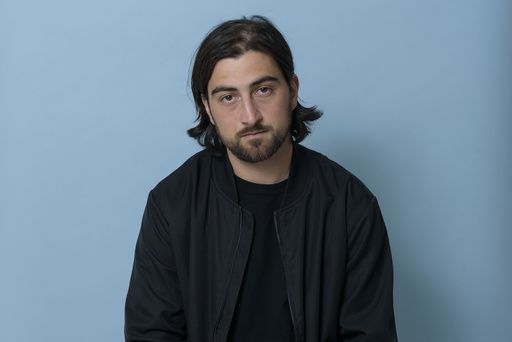Noah Kahan writes songs about New England. His vulnerability has far wider appeal
Singer-songwriter Noah Kahan poses for a portrait in New York on June 7, 2023, to promote his album “Stick Season.” (Photo by Christopher Smith/Invision/AP)
NEW YORK (AP) — Singer-songwriter Noah Kahan’s “Stick Season” is about New England — a topic the Vermont native says he could write about for the rest of his life — but it’s also largely about in-between spaces.
When resentment lingers but forgiveness feels possible. When a broken friendship is just beginning to mend. When homesickness clashes with a desire to leave. Or, in the case of the album’s title track, when fall hasn’t yet turned to winter.
Writing the folk-pop album, he told The Associated Press, felt “like breathing.”
Kahan revisits those themes through a new lens on the recently released “Stick Season (We’ll All Be Here Forever),” a deluxe version of the album that adds six new tracks and an extended version of fan-favorite “The View Between Villages.” The additions also see Kahan reflect on the eight months between the original album’s release and now.
“I’m speaking about the highs and the lows,” Kahan said of reconciling the version of home he’d written about with reality. “And the truth is it’s always somewhere in the middle when you really go back.”
“Stick Season,” the song, went viral last year, earning millions of streams fueled largely by social media. It wasn’t his first big release — at 26, Kahan has already put out three studio albums and two EPs. But it was one with momentum: Fans had latched onto the song long before its release, having heard Kahan perform it on pandemic-era Instagram livestreams and at shows that followed. When the single came out last July, Kahan called it “his favorite song ever” in a tweet.
Viral TikToks followed. Among them was a cover by two sisters seated at a piano, harmonizing.
“We’re Canadian. We’re very Canadian. At that point, we had never left the country,” Moira MacMullin, 24, one-half of the indie folk-pop duo Moira & Claire, told the AP. “But somehow we got into the emotions of it … there’s just something about his writing.”
Their TikTok video, posted the day after the song’s release, now has nearly 3 million views. Kahan commented on the TikTok: “Better than the original.” Moira MacMullin’s first trip outside Canada would be to see Kahan perform in Vermont.
“Everyone in the crowd is from Vermont, and I’m like (singing) ‘I love Vermont,’ and I’m not even from there,” she said. “It was so loud, and … just wild.”
Seeing fans connect with the song’s lyrics and themes has been “the coolest thing,” Kahan said, especially because “Stick Season” also marked his wholehearted embrace of the folk genre and childhood influences like The Avett Brothers and Paul Simon.
“When I would write songs that were more pop-y in a studio, I would go home and write a song that was more folk-y just for me because I felt like I was accessing that inner child,” Kahan said of previous projects. “Being able to finally explore that in this record and really lean into those inspirations and those feelings was really freeing.”
Moments of humor throughout the album reflect Kahan’s personality. But the topics he dissects are heavy — along with heartbreak, isolation and homesickness, there are references to substance abuse, death, depression and divorce. Kahan’s narrators aren’t perfect, but that’s the point.
Making the album about home, he said, felt like home. But watching it explode in the months that followed was challenging emotionally and creatively.
“I wanted to kind of show people who I was and continue to do that in the context of ‘Stick Season,’ but also explain this journey I’ve been on in the past year, with touring all the time and trying to be creative and feeling like I was a fraud,” Kahan, who has long been open about his mental health, said as he described the motivation behind the deluxe album.
That meant introducing some acceptance and grace, to counter some of the resentment he said imbued the original release: “In a lot of ways I wrote this record as a letter to myself to say it’s okay to feel these things and it’s okay to go on this journey.”
At a sold-out concert at New York’s Radio City Music Hall two days before the deluxe album’s release, Kahan encouraged “even the happiest person in the room” to be in therapy. He sang his lyrics, with their open references to depression, medication and therapy, and invited the audience to scream his words back to him.
Dressed in deep greens, browns, plaid and blue denim overalls, the crowd obliged, rendering the atmosphere at Radio City one you’d find at summer camp — and not just because the show fell on a day when the air outside smelled of bonfire smoke.
“Songwriting for me has always been a way to process my emotions. Sometimes I’m not great at processing them in a very logical way. Sometimes it takes me sitting down and writing a song to remember that I was feeling that way,” Kahan told the AP. “But for me the question is always can this help somebody get through their own discomfort … or problem or struggle?”
That’s part of why it felt like a natural step for him to launch The Busyhead Project, an initiative aiming to raise $1 million for organizations that specialize in mental health resources and awareness. Launched last month, the project named for his 2019 album has already raised over $340,000, with Kahan donating a portion of his tour ticket sales.
Joy Oladokun, Kahan’s tour opener, acknowledged her own mental health struggles during her set. Her latest album, “Proof of Life,” features a collaboration with Kahan, the dark-but-also-kind-of-funny “We’re All Gonna Die.”
“For me, music has always been about bridge building,” Oladokun told AP.
Acknowledging hard things in her songs or on stage before performing them “is very much central to my values,” like Kahan’s, she added. “That is the reason I leave my house and go on tour in the first place.”
But honesty can be brutal. These songs aren’t always easy to sing — or to sing along to.
“A lot of these songs talk about shame and about substance abuse and about parental flaws and family trauma. And those are tricky things,” Kahan said. “They’re tricky for me to write, and it’s tricky (for fans) to own that in a show and to sing it. But it’s a beautiful, beautiful thing to see.”
One song that’s been unexpectedly embraced is “Orange Juice.” Kahan has said the track, which alludes to sobriety, is about two friends who reunite after their relationship fell apart in the wake of shared trauma.
“That’s a song that I was almost not going to play because it felt so personal and so vulnerable,” Kahan said. Watching people own it on social media and at shows makes him proud.
“We are writing about heavy things and we are dealing with heavy things, and we are two sensitive people,” Oladokun said. But she also tries to keep some humor at the forefront of her projects. In the lyric video for “We’re All Gonna Die,” animated versions of the duo race coffins, parodying Mario Kart (which they also play together before soundcheck).
“We also like to have fun, you know?” she said.
2023 Invision
Copyright 2023 The Associated Press. All rights reserved.


